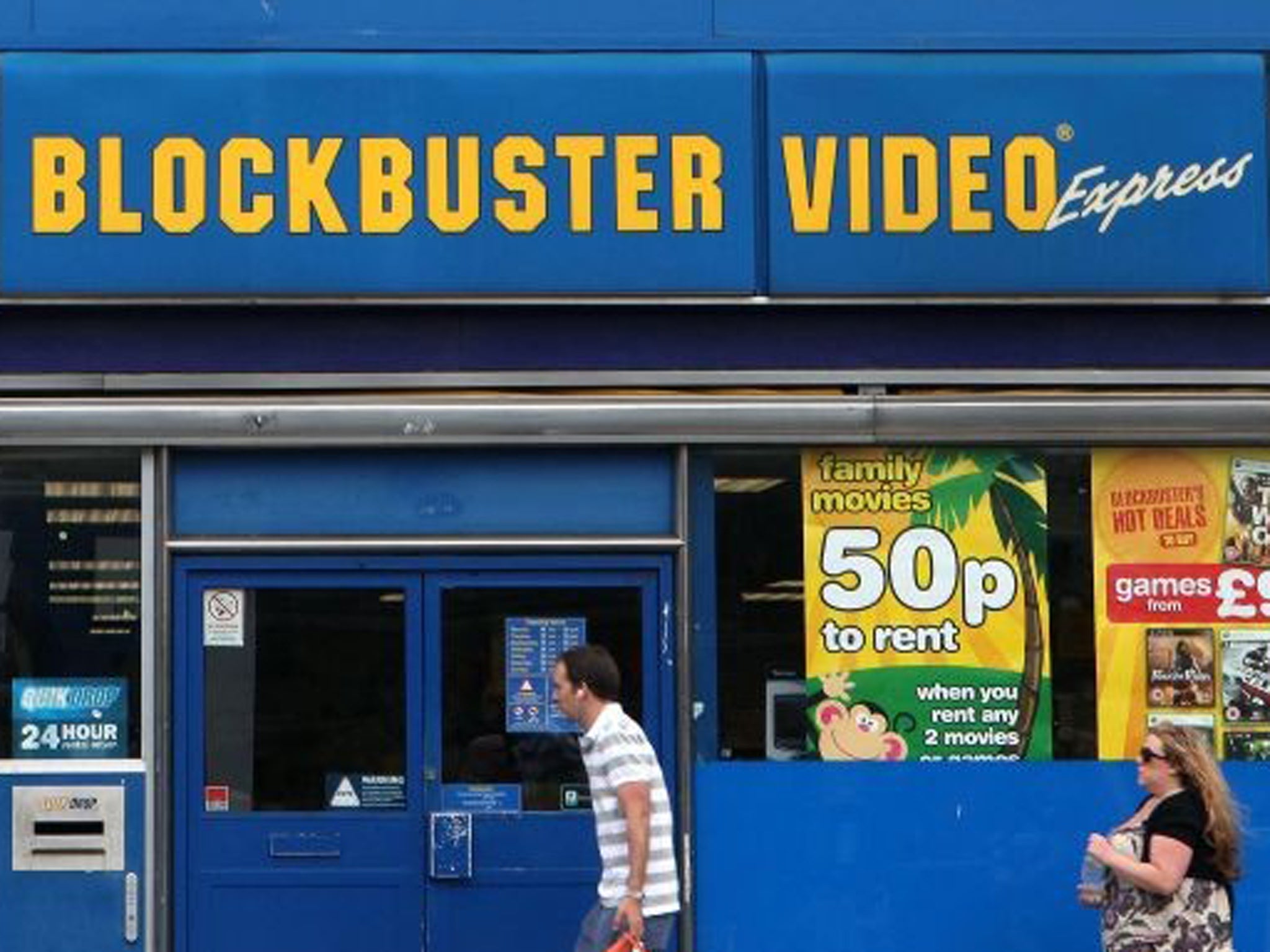Blockbuster falls as Britain’s retailers prepare for grim 2013
Thousands may lose jobs as video-rental chain becomes latest high street failure

The collapse of Blockbuster today capped a bleak week for Britain’s high street retailers and raised the grim prospect of nearly 17,000 job losses in a fortnight.
The 528-store video-rental chain joined the entertainment retailer HMV and camera specialist Jessops by calling in administrators.
Like HMV, Blockbuster UK was flattened by the huge shift in consumers buying DVDs online, at the big supermarkets and on Amazon, which also owns rival DVD-rental firm Lovefilm.com.
Blockbuster UK opened its first store in 1989. The video rental chain has been owned since 2011 by the American pay-TV provided Dish Network, which acquired Blockbuster’s US parent out of bankruptcy protection two years ago.
Professor Ajay Bhalla, of the Cass Business School in London, said the company, like HMV, had failed to transform its business model “nearly enough”. He added: “When it did, it found a fundamentally altered competitive landscape where the platform model had destroyed the tradition retail one.”
The collapse of the three chains follows the disappearance of the 236-store electrical chain Comet just before Christmas and has led to renewed calls for the Government to help the UK’s battered retailers by abandoning plans for another punishing rise in business rates in April.
Adrian Bailey, the chairman of the Commons Business Select Committee, said last night that he expected to set up an inquiry into the crisis. He said: “The situation is getting very serious. Even in more affluent areas there is already an increasing takeover of high streets by betting shops, fast food outlets and charity shops which do not provide the basis of a viable retail offering.”
The shadow business secretary, Chuka Umunna, said a “proper industrial strategy” was needed to promote “multichannel retailing, combining online trade with vibrant high streets”. He added: “This has been a grim week for the high street, but those who write off our high streets are defeatist and mistaken.”
David Cameron’s spokesman acknowledged it was a “very difficult” time for the thousands of shop workers facing potential unemployment. He said: “When it comes to jobs, the best thing we can do is support conditions for a private sector-led recovery.”
While HMV and Blockbuster will continue to trade as white knights are sought, the rapid closure of Comet and Jessops alone has left about 8,600 people out of work. The collapse of HMV and Blockbuster could see another 8,500 left jobless.
Joseph Robinson, lead consultant at Conlumino, the retail consultancy, said: “It is inevitable that there will be further casualties in 2013 which will add to vacancy rates and hasten the decline of some high streets.”
The British Retail Consortium (BRC) called for the planned 2.6 per cent business rate rise in Aril to be axed. It said the hike would add £175m to retailer's costs, and in some areas business rates are now higher than rents. The BRC said the seismic events of the last eight days on the high street was a stark illustration of “relentlessly weak consumer demand and rising costs”.
According to the Local Data Company, the number of high street retailers going into administration hit a record high in December and January. Its director Matthew Hopkinson said the slump could result in the number of empty shops rising from 14.3 per cent to an “all-time high” of 19 per cent.
Administrators Deloitte will seek a buyer for Blockbuster, but experts warned the number of its “physical presence” would be significantly reduced. Unlike with the administration of HMV this week, Deloitte has said gift cards and credit through Blockbuster’s trade-in scheme would be “honoured” towards the purchase of goods.
A tired-looking shop that couldn’t compete
James Thompson
My first visit to a Blockbuster in London for more than three years just before Christmas was revealing. With no HMV nearby, I had wanted to buy – not rent – some DVDs for a week off work and found a tired-looking shop with few customers.
While the North Finchley store had a poor selection of DVDs, the big surprise was that it was charging £5 to £8 for second-hand films to buy, so I bought brand new ones at HMV instead.
Like the collapse of the latter this week, the demise of Blockbuster UK will surprise few in the retail sector. Most of the British public stopped renting DVDs from Blockbuster’s stores or its website years ago, largely as rampant price deflation has meant they could buy them for roughly the same price, or even cheaper, in a supermarket or on Amazon.
Even avid DVD-renters have found Amazon-owned Lovefilm a more compelling offer. Others use the same rental firm’s movie streaming service or that of Netflix, which has an introductory offer of just £5.99 a month. Perhaps remarkably, Deloitte, which is also handling the administration of HMV, says Blockbuster UK’s core business is still profitable.
But while the accountancy firm is likely to find strong demand for the Blockbuster UK brand, it could find the 528-store business a much harder sell than HMV.
Subscribe to Independent Premium to bookmark this article
Want to bookmark your favourite articles and stories to read or reference later? Start your Independent Premium subscription today.

Join our commenting forum
Join thought-provoking conversations, follow other Independent readers and see their replies